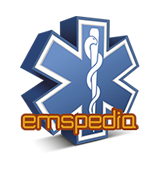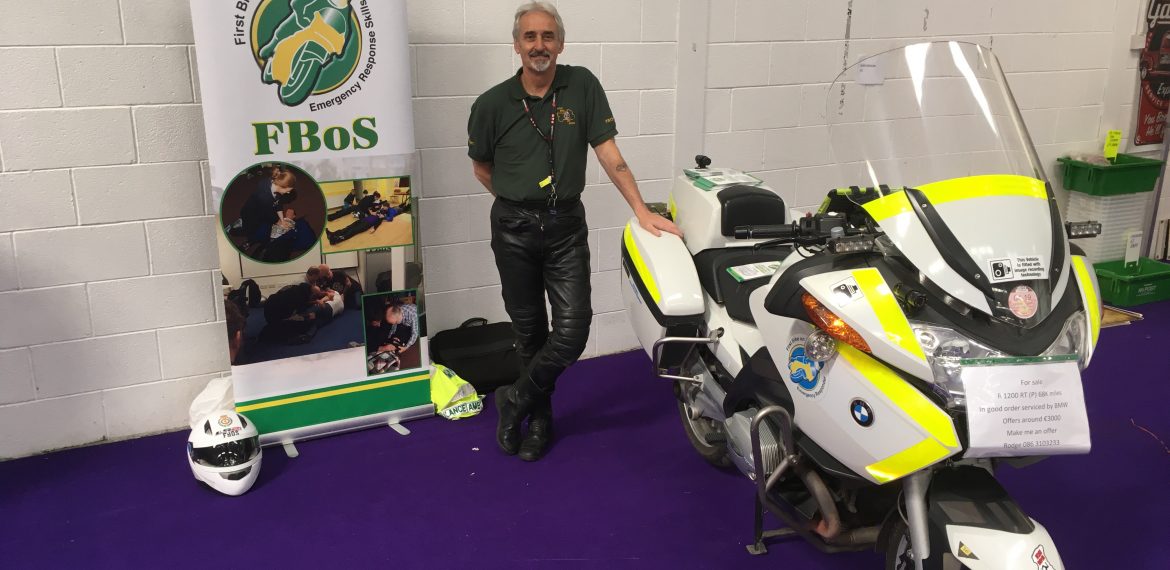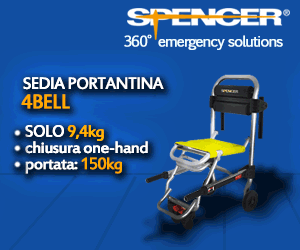In occasion of The Emergency Services Show 2018 on 19th and 20th September, in Birmingham, we interviewed professionals and experts in the emergency field who will participate at the event as speakers.
Let us touch an important topic related to emergency and pre-hospital care: road accidents.
In particular we found very interisting the aspect of teaching first response skills to motorcyclists who can have an essential role in case of road accidents, even if many of them do not know this.
We talked with Rodge Byrne, FBOS (First Bike On Scene) instructor and BIKERS Training in order to discuss about the role of motorcyclists in case of accidents. He is an Emergency Care Practitioner (ECP) and founder of www.bikerstraining.com provider of First Bike on Scene – Emergency Response Skills for the motorcycling community in Ireland and (some UK) programmes. Set up in 2011 with paramedic Colleague Nick and Bernadette FBOS Adminstrator.
LISTEN TO THE PODCAST:
- You have a wide experience both in motorcycling, while you are a biker, and in pre-hospital care, while worked in hospitals, in particular during your military career providing Acute Resuscitation & Trauma Skills. You will participate as speaker at the ESS2018 and you will talk about Emergency Response Skills for Motorcyclists.
On which points your speech will be focused on?
First Bike on Scene (FBoS) – 1 day training program is a Northwest Ambulance Services nwas.nhs.uk UK initiative to enable the motorcycle community to be capable and competent at the scene of a Road Traffic Collision (RTC) involving a motorcyclist. Initially established in 2008 and has since which time undergone regular innovations in keeping with changing professional protocols within emergency care practice standards. Now managed by FBOS UK Ltd based in Wales with associate training locations in 6 ambulance services across UK and 1 across Ireland
Motorcycling enthusiasts come from a wide range of society in age, gender and purpose for using their “bike”. Many use small cc sized Powered Two Wheelers (PTW) for daily commute, whilst others prefer larger bikes capable of much greater distance for leisure, holidays or hobby race track riding experiences.
Across the EU PTWs are often considered dangerous and are highly vulnerable road users. However, redress to statistics so readily available (from many studies, including MAIDS study) PTWs Rider is often the victim of poor Driver perception. This type of RTC referred to as a “T-Bone impact”, is where the car driver enters to road making a Right or Left turn into the path of the motorcycle with resulting impact into driver side door resulting in Killed or Seriously Injured (KSI) motorcyclist. Sadly a number of KSIs will be as result of excessive speed as the power to weight ration of PTWs can be a contributor to a RTC.With the above data in mind and along with our awareness as motorcyclists’ we combined our emergency care background and set about establishing www.bikerstraining.com initiative. My colleague Nick and I founded the agenda on and “All-Ireland” process functioning in Republic of Ireland and Northern Ireland. We share safety working relationship with Police Service Northern Ireland (PSNI) Bikesafe Team, as do other FBOS sites with UK Police bikesafe locations.
- In case of road accident, what are the emergency response skills a motorcyclist should have? How can a motorcyclist manage an emergency scenarios?
The key skills and issues addressed in the program are:
Safe approach and management of an accident scene, Airway Management, Injury Assessment, Management of head and neck (c-spine) injuries, Control of Bleeding, including recognition of catastrophic Bleeding, Safe helmet removal in special circumstances, Log Roll, movement use of Short – Long spinal boards and Vacuum Mattress, Trauma CPR reasons, Irish Heart Foundation Adult CPR with Automated External Defibrillator certification.
- In cases of suspected trauma, what could a motorcyclist do? Head Neck Injury risk, for example.
We focus on the bikers’ knowledge of “riding and risk calculation”, and enables the course participant’s to share-ask questions. Then following a brief overview of causes of trauma – effects of trauma we engage the group as individuals or 4-5 personnel team working to Watch, See and Do a the key learning elements listed (SOPs) utilized by Front- line Emergency Medical Service (EMS) providers.
- What kind of support a motorcyclist with emergency response skills can give to professionals who arrive on site?
Firstly we dispel Myths that EMS work is the solely provided by highly effective trained personnel as many of the life threatening events, a motorcyclist may be effected by following RTC, can be simply managed. In short “simple insightful actions will give superb outcomes”. Using Head to Toe approach / and some Acronyms to help remember the actions needed AVPU-CSMs
So often a Motorcyclist RTC can range from less life threatening soft tissue injuries (STIs) to catastrophic KSIs and inevitably the event will require multiple players acting out their roles in support of each other. We enable the bikers act as First on Scene, followed by supporting others once EMS arrived. Hence their readiness to act is critical as so many techniques in modern EMS events require 4-5 practitioners. We encourage the FBOS-ERS providers to offer their competence if they feel so motivated. They are by-standers.
- According to a psychological level, what are the tips a motorcyclist must bear in mind to provide the correct response?
We encourage the FBOS-ERS provider to apply the skills and competence they learn (but secretly hope they don’t have too), to the trauma of the RTC event. Use the Skills and Drills we have practiced and ideally if with other confident people lead the event until EMS arrive. RTC events are de-stabilizing, so it is significantly important to carryout post-event critical stress review. So both Nick, Berni (FBOS Adminstrator) and I conclude all our FBOS-ERS programs with, if you do attend an RTC and use your FBOS-ERS, “Talk about it, Talk about it, and feel free to contact us to gain some further support.
In the 7 years we have been actively promoting the program we have personally trained 1000 Motorcyclist and a number of motorist. We have communication from 45 FBOS-ERS provider who have attended RTCs with some amazing outcomes. Without exception all of those providers concluding they did “not have to be Helpless and suffer the effects of that”, and contributed what they Know they were capable of and competent to provide “To make a difference to another Biker”
Our moto being “Bikers training Bikers to save Bikers Lives”
Find Rodge Byrne on 19th Sept. at the Lessons Learnt Theatre, from 13:25 to 13:55.


